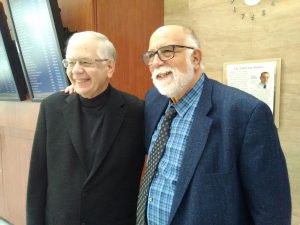Rudd accepts misdemeanor plea deal; felonies vacated
By Gregory Harutunian For Chronicle Media — March 19, 2018
Dr. Thomas Rudd (left) and defense attorney Jed Stone following the March 14 hearing. (Photo by Gregory Harutunian/for Chronicle Media)
The case of five felony charges of perjury against Lake County Coroner Dr. Thomas Rudd, stemming from his signature as circulator on five pages of nominating petitions, went away quietly in a March 14 hearing. Circuit Court Judge Victoria Rossetti presided over the session, where a plea offer submitted by the prosecution was formally accepted, ending a controversial saga that began in February 2016.
In vacating the five felony counts, Rudd pleaded guilty to five misdemeanor counts of disregarding the election code as a technical offense, serve a two-year conditional discharge, pay $5,000 in fines and additional court administrative costs, and make a $5,000 donation to the Carbondale-based Paul Simon Public Policy Institute. Further, he will be restricted from running for public office or working for a governmental agency at the county and state level for five years beyond the term of the discharge period.
The fines and seven-year ban are in accordance with state law defined for the offense, although the pertinent election code still remains shrouded in gray. The code stipulation was the subject of court hearings in Effingham County, where it was struck down as unconstitutional, and set aside in a downstate Bloomington case.
Ken Menzel, lead attorney for the Illinois State Board of Elections, had said the statute was entered into law to prohibit a candidate from running for office twice in the same election cycle. However, there is still no provision guiding candidate disposition when the nominating petitions are withdrawn, along with the candidacy.
“The restriction on working for the government or holding elected office is a unique provision found in the state statute, and was an important element in the agreement moving forward,” said Special Prosecutor Bernard Murray. “There were people that were arrested and convicted of fraud, and five years later, they are back working for the government. It’s as if you are rewarding bad behavior.”
In addition to the vacating of the felony charges, the agreement allows Rudd to maintain his medical license, avoid incarceration, and not impinge upon his first amendment rights of free speech.
In December 2015, Rudd was scheduled for a hearing before the county’s Electoral Board of Review over an objection filed against his nominating petitions for re-election to the county coroner position. Rudd admitted signing petition pages as the circulator in error, on bad counsel, in withdrawing his candidacy and the petitions. He then mounted a campaign as an Independent Candidate, and garnered more than 14,000 signatures that were not challenged.
An objection was filed citing the statute code of running twice in the same election cycle. Rudd challenged the code through the county electoral review board, the circuit court, and the appellate court, which entered its decision online Aug. 31, 10 minutes before the close of business. The next day, Sept. 1, the printing of ballots began.
With the Illinois Supreme Court refusing to hear the case, a write-in campaign during the Nov. 2016 general election netted him more than 8,000 votes. Three months later, Rudd was indicted by the Lake County Grand Jury on five counts of perjury for signing five pages of petitions as the circulator. Lake County State’s Attorney Michael Nerheim presented the grand jury with the evidence, and summarily requested a special prosecutor from the Illinois State’s Attorney Appellate Special Prosecutor’s Office.
The first appointee was Brian Towne, the former La Salle County State’s Attorney, who was replaced after he was indicted in September on felony and misdemeanor counts. Springfield-based attorney Charles Zalar was then assigned, but subsequently resigned, due to personal health issues. Chicago-based attorney Murray was named last Dec. to prosecute the case.
A May date had been set to begin the formal trial process, when the plea offer and conditions was tendered in early March, and accepted March 12 by the defense.
The 13-month legal process has also carried political overtones, as a “payback” for Rudd’s use of science and pathology in determining or changing the cause and manner of death in several high-profile cases including Darrin Hanna, Benjamin Kingan, and Fox Lake police Lt. Charles Gliniewicz.
“If anyone doubts that the prosecution of Thomas Rudd was politically based, one needs only to look at the prosecutor’s demanded condition of this misdemeanor charge,” said defense attorney, Jed Stone, in a prepared statement. “Dr. Rudd will be barred from ‘public employment’ for five years … Justice prevailed today when perjury counts were dismissed.
“But the public good has been injured by the prosecutors who deny the public of a thoughtful and decent man.”
Rudd spoke briefly, following the hearing.
“I’m just glad that it’s over,” he said. In December 2015, the nominating petitions were withdrawn and I did the honorable thing in stepping down. You make a mistake, you try to correct it. I am deeply saddened that the state wasted all this time and all this money for what amounted to a clerical error.”
Matthew Stanton, an adjunct professor on constitutional law at the Chicago Kent School of Law, and former Lake County State’s Attorney candidate, has monitored the Rudd case.
“This illustrates how Illinois election law is in desperate need of reform,” he said. “We need to streamline the process of a candidate getting on the ballot … where a set of arcane rules make it necessary for a candidate to have a team of election attorneys on staff. Here, a popular incumbent was tripped up by what would be considered a technical glitch in any other context.
“This was a case of first impression meaning this has never been tried in court before … the prosecution was unprecedented.”
—Rudd accepts misdemeanor plea deal; felonies vacated–







